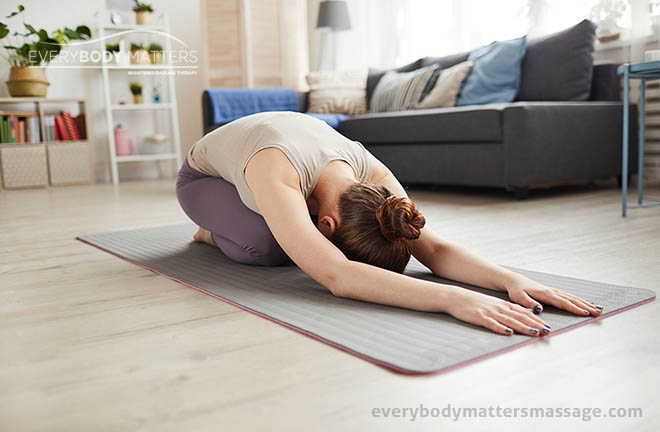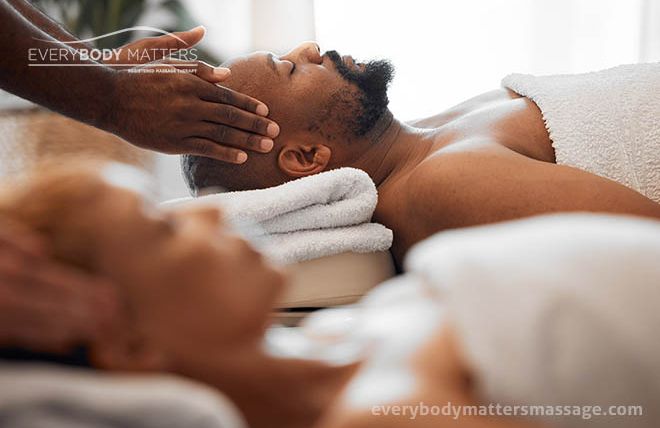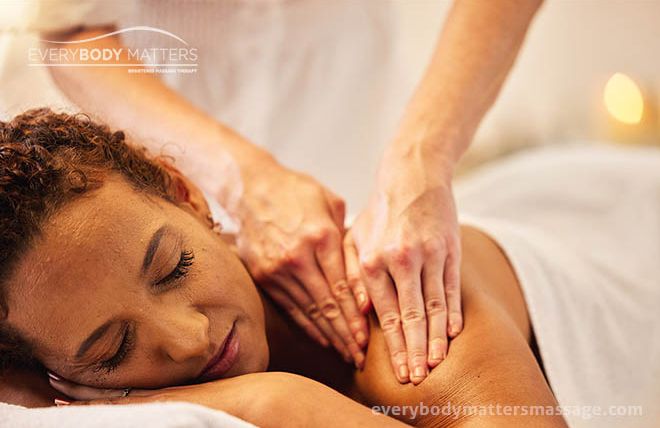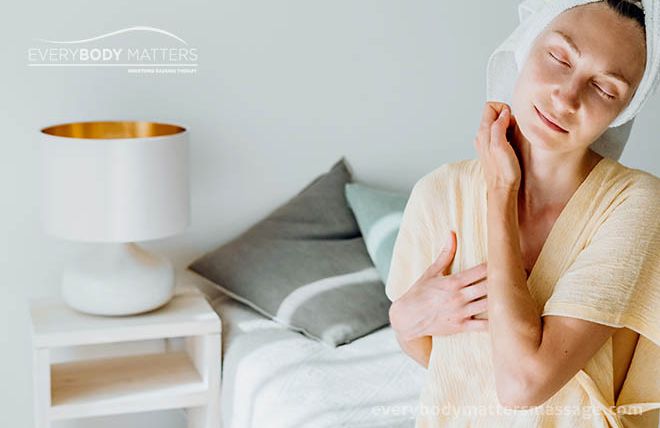Discover the Transformative Power of Massage Therapy for Your Self-Care Routine

Introduction: The Importance of Self-Care and Benefits of Massage Therapy
In today's hectic world, individuals tend to forget to take care of themselves. With busy work deadlines, social media obligations, and countless demands, self-care is typically the last thing on their minds.
Nevertheless, disregarding self-care can bring about a decrease in one's overall health and wellness. Hence, it is essential to give precedence to practices that can help maintain physical, psychological, and emotional wellness. One such practice is massage therapy. Massage therapy comprises the manipulation of the body's soft tissues employing varied techniques like rubbing, vibration, striking, and long strokes.
It has been employed as a method of alleviation and healing for centuries. Massage therapy has numerous gains that are much more than just relaxation or diminishing muscle stress. Massage therapy can be an effective form of self-care that can noticeably improve your general welfare. Frequent massage sessions can help in allaying chronic pains such as fibromyalgia or arthritis while also diminishing levels of stress attendant with modern living.
The Importance of Self-Care
Self-care refers to taking an active role in maintaining one’s own physical, mental, and emotional health through practices that promote relaxation and stress reduction. Engaging in regular self-care activities has been shown to improve resilience when dealing with daily stressors while enhancing general feelings of well-being.
Self-care should be viewed as an essential part of one's daily routine rather than something reserved for special occasions or when we feel overwhelmed. It helps individuals cope with daily challenges by improving their mood and increasing focus on personal goals.
The Benefits of Massage Therapy
Massage therapy offers numerous health benefits such as reducing anxiety levels while promoting muscle relaxation and increased flexibility over time with regular treatments. It also improves blood circulation throughout the body which supports tissue rejuvenation while stimulating lymphatic drainage systems necessary for the removal of waste products from cells. Moreover, massage therapy has been found to reduce cortisol levels which are associated with stress and anxiety.
This reduction in cortisol levels leads to an increase in serotonin and dopamine production, helping improve mood and boost energy levels. Massage therapy is a powerful form of self-care that can significantly impact your overall well-being.
By prioritizing self-care practices such as massage therapy, individuals can achieve a better quality of life by reducing stressors, improving relaxation, and promoting physical health. The following sections will delve deeper into the scientific mechanisms behind how massage therapy works to provide physical and emotional benefits while also highlighting some practical ways you can incorporate it into your daily self-care routine.
The Science Behind Massage Therapy
Massage therapy has been around for centuries and is used to promote relaxation and healing in the body. But how does it work? When you receive a massage, your therapist manipulates your muscles, tendons, and soft tissues using various techniques.
This manipulation stimulates blood flow to the area, which helps to oxygenate the cells and remove waste products. It also releases tension in the muscles, which can help reduce pain and improve mobility.
There are several different types of massage therapy that use varying techniques to achieve these benefits. Swedish massage is one of the most popular types of massage therapy and involves long strokes, kneading, and circular movements on the topmost layers of muscles.
This gentle form of massage is perfect for those who are new to massage therapy or who just want to relax. Deep tissue massage, on the other hand, uses more pressure to reach deeper layers of muscle tissue, making it an effective treatment for chronic pain or injury recovery.
Specific to the Massage Benefits
Each type of massage therapy comes with its own set of benefits for both physical and mental health. Swedish massages have been proven to significantly reduce cortisol levels in individuals which lower stress levels by activating parasympathetic nervous system which is our bodies rest & digest response rather than fight or flight response as activated by stress hormones like cortisol. Deep tissue massages offer a wide range of physical benefits such as reduction of chronic pain, increased mobility and better posture.
However, they can be more intense than other forms of massage therapy and require some recovery time. Hot stone massages are known for their ability to help increase circulation and relieve muscle tension without causing any damage to tissue due to the stones being heated at a safe temperature.
Shiatsu massages are great for treating specific issues in the body like tightness or pain in the neck as well as increasing flexibility around joints by applying various techniques that involve manipulating limbs and joints. Regardless of which type of massage you choose, regular sessions can lead to improved overall health and well-being.
The Physical Benefits of Massage Therapy
Reduction in Muscle Tension and Pain Relief
One of the most significant physical benefits of massage therapy is the reduction in muscle tension and pain relief. Through targeted pressure application, massage therapy can help to loosen tight muscles, reduce knots, and ease general aches and pains.
Chronic pain can have a profoundly negative impact on our physical and mental well-being, so by reducing pain levels, massage therapy can enhance our overall quality of life. Additionally, massage therapy has been shown to help reduce inflammation in the body.
Inflammation is linked to a wide range of health conditions such as heart disease, cancer, and arthritis. By reducing inflammation through massage therapy, we give our bodies a boost in fighting off illness.
Improved Circulation and Lymphatic Drainage
Massage therapy also has positive effects on circulation within the body. By using techniques that apply pressure to specific areas of the body, massage therapists are able to stimulate blood flow throughout the body. This increased circulation helps deliver oxygen and other nutrients more efficiently to various parts of the body.
In addition to improved circulation, massage therapy has also been shown to improve lymphatic drainage. The lymphatic system plays an essential role in removing toxins from our bodies.
When this system isn't functioning properly or becomes sluggish due to factors such as stress or an unhealthy diet, it can lead to swelling or fluid buildup in different areas of the body. By stimulating lymphatic drainage through massage therapy techniques like lymphatic drainage massage or myofascial release work, we're able to better detoxify our bodies.
Increased Range of Motion and Flexibility
Massage therapy can also help improve our range of motion and flexibility by targeting specific muscle groups with stretching techniques. Tight muscles can limit mobility within joints leading us feeling stiff or unable to perform certain movements. By applying pressure and stretching techniques, massage therapists can help lengthen muscles, and increase flexibility at the joints.
Overall, the physical benefits of massage therapy can have a profound impact on our daily lives. By reducing pain levels, improving circulation and lymphatic drainage, increasing range of motion and flexibility we're better able to maintain optimal health.
The Mental Benefits of Massage Therapy
Massage therapy is not just beneficial for the physical body but can also have a remarkable impact on one's mental health. One of the most significant mental benefits of massage therapy is its ability to reduce stress, anxiety, and depression symptoms. When you are receiving a massage, your body releases endorphins which are natural chemicals that promote feelings of pleasure and well-being.
Endorphins also help to reduce stress hormones such as cortisol and norepinephrine, leading to reduced feelings of anxiety and depression. In addition to promoting the release of endorphins, regular massage therapy sessions have been found to improve sleep quality.
When we are stressed or anxious, our minds tend to race at night, making it difficult to fall asleep or stay asleep. By reducing stress levels and promoting relaxation through massage therapy, individuals may experience deeper sleep cycles leading to more restful nights.
It is important not to underestimate the power of relaxation when it comes to improving one's mental health. Many people lead busy lives with long work hours and busy schedules that leave little time for self-care.
Incorporating regular massage therapy sessions into your routine can be a powerful tool in helping you relax and unwind after a long day or week. Taking time for yourself can help you reset mentally, leaving you feeling refreshed and revitalized.
The Emotional Benefits of Massage Therapy
Massage therapy is an effective form of self-care not only for physical well-being but also for emotional and mental health. Various studies have found that massage therapy can lead to reduced levels of anxiety, stress, and depression, while increasing feelings of relaxation and overall well-being. In addition to these benefits, massage therapy has also been shown to improve mood, increase feelings of well-being, and enhance self-esteem.
Improvement in Mood
Massage therapy has been linked with the release of endorphins – the body's natural painkillers – which can lead to a sense of euphoria or "runner’s high." This release can help alleviate negative emotions such as anger or anxiety by providing a sense of relaxation that may otherwise be hard to achieve. Furthermore, massage therapy can help increase levels of serotonin and dopamine which are neurotransmitters responsible for regulating mood. These chemical changes in the brain often translate into an elevated mood right after a session.
Increased Feelings of Well-Being
Massage therapy can have an immediate positive impact on one's overall sense of well-being. Studies indicate that regular massage sessions boost immunity by increasing white blood cell counts which fight off infection cells in the body.
Massage therapy also helps lower cortisol levels in the body, leading to reduced stress levels and better mental clarity. By enhancing relaxation and reducing muscle tension, massage therapy creates an environment where clients feel more comfortable being vulnerable about what they are feeling emotionally.
Enhanced Self-Esteem
Many people struggle with low self-esteem due to physical or emotional scars from past experiences or simply from feeling unsupported in their lives. Massage therapy offers a safe space for individuals who may be struggling with body image issues while creating positive associations between touch and human connection. As individuals receive more massages over time they may start finding it easier to connect with their own bodies and feel more comfortable in their own skin.
By cultivating a more positive self-image, individuals can experience enhanced confidence and self-esteem that often carry over into other areas of life. Massage therapy is not just about physical health but also emotional and mental well-being.
Improvements to mood, increased feelings of well-being and enhancement of self-esteem are just some of the benefits that come with regular massage therapy sessions. It's an investment worth making not only for your body but also for your mind and spirit.
How to Incorporate Massage Therapy into Your Self-Care Routine
Massage therapy can be a great addition to your self-care routine, but it can be challenging for some people to find the time or money for regular treatments. Here are some tips on how you can incorporate massage therapy into your self-care routine effectively.
Schedule Regular Appointments
The best way to incorporate massage therapy into your self-care routine is by scheduling regular appointments with a licensed massage therapist. Ideally, you should aim to have a massage session at least once a month, but if possible, consider having one every two weeks. Booking an appointment in advance will help you make sure that you have time set aside for this essential aspect of self-care.
Try Different Types of Massage Therapy
There are various types of massage therapies available, and each has its unique benefits. To get the most out of your massages, try different types of massages and determine which ones work best for you. For example, if you experience chronic pain or muscle tension, deep tissue massage may provide relief; if stress is an issue for you, consider trying Swedish or deep tissue massages.
Use Self-Massage Techniques at Home
While seeing a professional massage therapist is ideal, it's not always possible or practical. Fortunately, some self-massage techniques are easy to do at home and require no special equipment. These include foam rolling and using tennis balls or other tools to target specific areas where tension accumulates the most.
Conclusion
Incorporating massage therapy into your self-care routine is an effective way to enhance your physical and mental well-being. The science behind this ancient practice shows that it reduces muscle tension and promotes relaxation while managing symptoms like depression and anxiety.
It's also relatively easy to integrate into your daily life - from booking regular appointments with a licensed massage therapist to trying self-massage techniques at home. By taking care of your body and mind through massage therapy, you're making a crucial investment in your health and overall well-being.
Do you live in the GTA?
Ready to book your massage?
It's quick and easy, just click the button below and follow the instructions. You will receive confirmation and all the patient intake forms via email. Kindly read, complete and sign intake and consent forms, including cancellation policy. I believe everyone's time is valuable, and as a courtesy to everyone, we thank you for being on time. Late arrivals can only be extended to the time remaining in the scheduled session. If you cancel with less than 24 hours notice, or miss your appointment, you will be charged for the entire amount of your scheduled treatment. Insurance does not reimburse claims for late cancel lations or missed appointments.
If you don't see the time you are looking for, please add yourself to the wait list.
If an appointment becomes available, you wil l be given priority.







